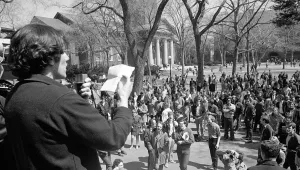Summary
This workshop report, based on two days of intense discussions hosted by the Institute for Global Leadership at Tufts University and held under the Chatham House rule, summarizes the predominant views of a select group of Afghan politicians and former military officials, Pakistani journalists and scholars, current and former United Nations officials, diplomats, humanitarian workers, and representatives from the U.S. military on the opportunities for, and obstacles to, security and political reconciliation in Afghanistan.
The workshop highlighted six inherent tensions to the conflict and the U.S.-led coalition's chosen strategy: (1) the disjuncture within the Afghan body politic and President Hamid Karzai's crisis of legitimacy; (2) the fragmented nature of the insurgency in Afghanistan; (3) conflict between the near-term political horizon of the United States and its coalition partners and the requirements for long-term stability of Afghanistan; (4) the balance between national and local authority in the country; (5) the classic clash between the imperatives of justice and durable peace building; and (6) the impact of regional tensions and U.S. policies on the prospects for (a) brokering a stabilization plan endorsed by major regional and external powers, and (b) "re-neutralization" of Afghanistan and preventing its reversion to the pre-U.S. invasion status quo ante.
The near-term prospects for security and political reconciliation in Afghanistan are bleak. Nonetheless, the United States, its coalition partners, and neighboring states can still assist in shaping sustainable, Afghan-led stabilization, in accordance with their overlapping national interests. In the short term this effort will require (1) recognition of inherent tensions in the current U.S. strategy as well as within the regional geopolitical environment; (2) clarity about the overwhelming effect of U.S.-led coalition military operations and the mendicant aid economy on key stakeholders' incentives; and (3) a focus on using eight years of painful lessons learned to guide future policy.
In addition, policymakers should consider the following recommendations:
- Draw on the Taliban narrative of "a moral force fighting corruption and anarchy," to create opportunities for members of the Taliban and their supporters to join the peaceful political process. Ensure that any narrative of reconciliation also appeals to non-Taliban peaceful opposition groups.
- Move beyond material incentives when designing reintegration and reconciliation (R&R) programs, to give primary focus to the political drivers of the conflict at both the local and national levels.
- Err on the side of political inclusiveness when resolving and clarifying the status of individuals currently detained by the coalition or by the Afghan government or subject to international sanctions. This effort also requires a reexamination of those targeted for capture or elimination to ensure that coalition troops are not used to settle scores among local rivals.
- Incorporate lessons learned from the earlier Disarmament, Demobilization, and Reintegration and Disarmament of Illegal Armed Groups programs, to overcome the legacy of mistrust left by these failed efforts. Ensure that the mistakes of these programs are not repeated in future reintegration and reconciliation efforts.
- Guard against the moral hazard risks in the R&R effort, particularly those that signal that the "politics of disruption" pay, with the consequence of providing unintended incentives to individuals to participate in violent opposition activities.
- Defend communities not only from insurgents but also from predation by Kabul, provincial capitals, local power holders, and associated local security organizations.
- Monitor and adjust the incentives created intentionally or unintentionally by international aid and military operations, to ensure they do not exacerbate the conflict.
- Shift the focus on the opium economy from the relationship between narcotics and the insurgency to one that also addresses the substantial role of key government officials in the drug economy.
- Overcome suspicions by Kabul and the insurgency about the United Nations' mediation role. If these suspicions are entrenched, an alternative interlocutor suitable to all parties must be identified, legitimated and put into action.
This workshop report does not reflect in any way a consensus view or capture the considerable variation in analysis of the current situation or desirability and feasibility of the current strategy in Afghanistan and Pakistan. The authors are solely responsible for the content, as well as any error or omission.
Chorev, Matan and Jake Sherman. “The Prospects for Security and Political Reconciliation in Afghanistan: Local, National, and Regional Perspectives.” Belfer Center for Science and International Affairs and The Institute for Global Leadership, May 2010





